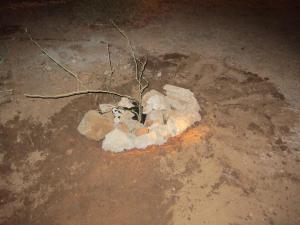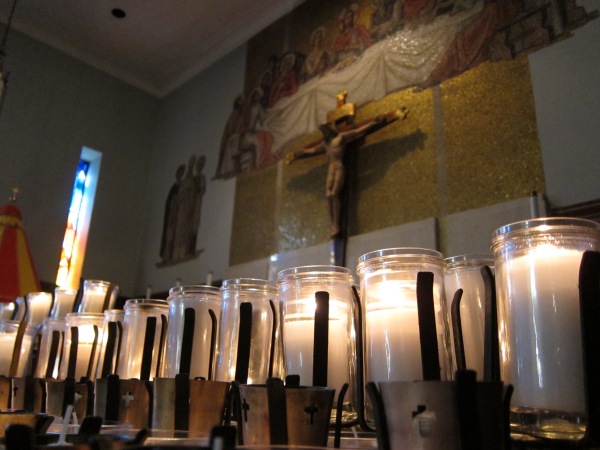A Sermon based on Hosea 11:1-1 Luke 12: 13-31; Preached at La Jolla Congregational Church, UCC
The hymn we just sang (God of Grace and God of Glory), aside from being one of my favorites, was written by Harry Emerson Fosdick one of the major theologians of the modernist movement during the twentieth century. For Fosdick, the Bible was a repository of our basic human experiences. (1) Religion for Fosdick was, as one historian wrote “a psychological experience….an experience that makes a difference, for the kind of religion that matters is the kind that saves, that is to say, the kind that integrates, strengthens, and enriches the personal lives of those who engage it.” (2) The role of human experience was important to the theological and biblical understanding of Fosdick and other of the modernist theologians of the twentieth century.
“God of Change…” I wonder what Fosdick would think of the scriptures before us this morning. I wonder how he might take the social, political, and economic realities of our own time and interpret these scriptures today. He of course is long since gone, so I am afraid you will have to allow me this morning to step in for him and look at these scripture with you to see what ‘meaning may yet break forth’ from them for us today. (3) As I have thought about these texts this week I have come to the basic ideas outlined in my sermon title: God Loves. God Provides. God’s Kingdom.
Now there are those persons who might tell me that I am stretching it to find the message that God Loves in the Book of Hosea. I am not, but it is true that this prophetic book is one that recounts the tresspasses that led to the exile of the Northern Kingdom of ancient Israel, and it was not pretty. Much like, Fosdick, Hosea was a prophet trying to make sense of his world. For Hosea, the world he came into was one in which God had made promises to love and care for, to prosper the people, of Israel. But the rules changed. Hosea found himself in a time in which numerous Kings of the Northern Kingdom of Israel were assassinated; a time in which political and military alliances were being made with Assyria–an oppressor of the Kingdom Israel at the expense of traditional allies. It really did not make a lot of sense… Hosea and his people found themselves in a world of change, a world in which exile would arrive. Theologically speaking, the people of the Northern Kingdom had turned their attention away from their covenant with God and the aspects of their lives that defined their society, and focused their attentions on chasing the political powers and material wealth that kingdoms outside Israel might provide. The Northern Kingdom had shifted their focus from the values of covenant to placing ultimate meaning on material gains and wealth and the prophetic record is clear they paid for their focus on materialism and wealth with exile. Which way are choosing in our own day?
The Book of Hosea is a book of prophecy so it is not all doom and gloom…there is hope. Hosea’s doom and gloom, however, are a warning about the downfalls that await a society that strays from right relationship with God. For right relationship with God that is at the very heart of prophetic messages. For Hosea, the hope for restored right relationship lies in the history of God’s love, care, and historical provisions for the people of God’s covenant. It is this hope in God’s love for God’s people that rings through our passage for this morning.
Our passage from Hosea this morning portrays God’s love for the people by recounting the God’s acts of providing for the people of Israel. Hosea recounts the Exodus quoting God as saying “When Israel was a child I loved him, out of Egypt I called my son” (Hosea 11: 1-11). Then the prophetic narrative goes on to portray God telling the story of God’s presence in the life of the Northern Kingdom “It was I who taught Ephraim to walk…I led them with cords of human kindness with bands of love. I was to them like those who lift infants to their cheeks.” (Hosea 11: 3-4) This is not a God far off but a God who is intimately involved in the life of the people. It may even be that the reference to Ephraim is a reassurance to the people of the North Kingdom, as their first King Jeroboam was from the house of Ephraim. (4) The metaphors used to portray God’s acts of love toward the people are ones we would expect to find in reference to a loving parent.
(Feminist scholars would note that it is significant that the metaphors for God in this passage of Hosea refer to the love either a father or mother would give a child. It is significant because the rest of the Book of Hosea is often very harsh towards women. Thus to portray God’s love and protection in gender neutral way here of all places is such a rarity of the prophet it must be paid attention to as carrying another layer of meaning. (5) We shall, however, leave the feminist treatment of Hosea for another day.)
Our passage from Hosea concludes with God providing for the people to return from exile to their own homes, once right relationship with God is reestablished.
Perhaps Harry Emerson Fosdick would ask us, at this juncture, how we maintain our right relationship with God? How do we balance our need to live in society, exist on the material level, and maintain relationship with God in light of our hope for the coming of God’s Kingdom? How indeed do we find the wisdom & courage “for the facing of this hour”? (6)
As Christians, we look to the gospel for guidance and wisdom in how to maintain right relationship with God. The gospel lesson the lectionary presents us with today, verses 1-11, are those that deal with the distribution of wealth and the accumulation of goods. However, if we read further in the text we learn that it is not enough to just note that Jesus refused to address the just distribution of wealth, when he refused to address the man’s concerns about inherited possessions. It is not enough to note that Jesus warns those who hoard material goods that God will make a mockery of material hoarding, when God comes like a thief in the night to call us from this life (Luke 12: 20). Whereas Hosea was concerned with the national or corporate pitfalls of striving for power and wealth; the Gospel speak to us of our individual drives for power and wealth.
The parable alone is not enough,to understand the Jesus meaning. It is Jesus’ commentary to his disciples after the parable if the rich fool, in verses 12-31, that teach the spiritual values if the Kingdom of God that Jesus trying to impart to those he had chosen to spread his message. In the verses following the parable, Jesus’ teaching to the disciples makes it clear that he does not address the man’s concern about the division of inherited goods not because Jesus is disinterested in the division of material goods, but because it is the wrong concern to focus on. Jesus affirms at the end of this speech that God knows we need the materials necessities of life (Luke 12: 30). Jesus’s point is that all those material things are not only not the point and goal of living but can actually get in the way of our right relationship with God.
Jesus’s teaching to the disciples in verses 12-31 speak directly to the the value of human worth and value of human life. Here Jesus reminds the disciples that the birds do not work; they behave as expected of birds. The parallel for us seems to be that we are to be concerned less with doing work, but in being human. Similarly Jesus teaches the disciples that we are valuable to God just because we are who we are, not because of the things we do. Jesus teaches that the value of the lilies is in the inherent beauty of their nature, which far surpasses what can be accomplished by human hands. Jesus attempts to teach the disciples that we are human beings, and not human doings.
This is not an easy teaching. I often wonder if the disciples grew to understand this teaching. I often wonder if we understand it today.
As a hospice chaplain I often interact with persons facing depression, not so much because they facing the end of their lives, but because they no longer are able to do the things they once did or fulfil their roles as they once did. You see in our contemporary individualistic society we tend to place ultimate value on doing and providing for one’s self, and that is how we judge human worth. So when people can no longer do for themselves they face a crisis of meaning, which I tend to think of a crisis of being. At the root it is a crisis caused by being human and vulnerable. In these situations I often find myself coming to this scripture about the lilies. You see we have worth because we are living, because we are in relationship with God; not because of what we may do or accumulate. It is hard thing, in our society, to comprehend that our worth rests in something we have no control over at all, its all ”God of Grace”.
I was at our recent Synod in Long Beach. And while I am one of the first people to get excited about the theological implications of a God who is still speaking, I heard this so ad nauseum that I started thinking….about the the still speaking God…About myself as a person who started life with profound speech impediment…There are so many ways to communicate, why would God need always to speak? I started thinking about the persons with whom I minister: those who are dying, those who struggle with worth; then I thought of those who never spoke and those whom can no longer speak. How does a still speaking God speak to them? I recalled, in that convention hall so full of speeches, how profound it is to sit in silence, to try to be rather than do, and I knew that simply being is way of living I have yet to understand much less to master. And I then thought..what about the God who can not speak?
The “speaking” of God and human beings is our covenant or relationship. Given that we live with a “God of Change and God of Glory”, how do we interpret the prophetic text from Hosea and Jesus’ parable about the rich fool and Jesus’ lillies in light of our own experiences? Like Hosea and his people, like the farmer with full barns, we too are called by our covenant with God to be God’s people so fully concerned with the importance of human personality that our focus remains right relationship with God. (7) What do we do with that call? What would Harry Emerson Fosdick, have me say?
It occurs to me that what I might say is this: What if God is still loving, and God is still providing, but we are so concerned with wall street and the dow, with NASDAQ and the unemployment rate, with behaving as the superpower and keeping “other” people where they “belong”…What if we are missing our call to live into God’s Kingdom? What if God can no longer speak, because in our experiences we have become so consumed with the idols and of modern life that we are no longer listening?
Endnotes
(1) Macquire, John. Twentieth Century Religious Thought. (Trinity Press: Harrisburg, 2001) 189.
(2) Ibid.
(3) Play on a quote famous in the UCC, from a sermon Robinson wrote to a congregation upon reaching the new world.
(4) From “Ephraim” at http://en.wikipedia.org/wiki/Ephraim, accessed August 3, 2013.
(5) Yee, Gale. “Hosea” in the Women’s Bible Commentary (Louisville: John Knox, 1992) 200.
(6) Harry Emerson Fosdick, “God of Grace and God of Glory”, as printed in Hymnal of the United Church of Christ. (Philadelphia: United Church Press, 1974).
(7) See commentary by Moore, Rickie in Renovare Spiritual Formation Bible (San Francisco: Harper Collins, 2005) 1273-1274.


